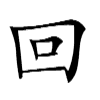回
| ||||||||
Translingual
| Stroke order | |||
|---|---|---|---|
 | |||
Han character
回 (radical 31, 囗+3, 6 strokes, cangjie input 田口 (WR), four-corner 60600, composition ⿴囗口)
References
- KangXi: page 216, character 26
- Dai Kanwa Jiten: character 4690
- Dae Jaweon: page 422, character 4
- Hanyu Da Zidian: volume 1, page 712, character 2
- Unihan data for U+56DE
Chinese
| simp. and trad. |
回 | |
|---|---|---|
| variant forms | 囬 囘 | |
Glyph origin
| Historical forms of the character 回 | ||
|---|---|---|
| Western Zhou | Shuowen Jiezi (compiled in Han) | Liushutong (compiled in Ming) |
| Bronze inscriptions | Small seal script | Transcribed ancient scripts |
 |
 |
 |
| Characters in the same phonetic series (回) (Zhengzhang, 2003) | |
|---|---|
| Old Chinese | |
| 回 | *ɡuːl |
| 徊 | *ɡuːl |
| 茴 | *ɡuːl |
| 洄 | *ɡuːl |
| 迴 | *ɡuːl, *ɡuːls |
| 佪 | *ɡuːl |
| 蛔 | *ɡuːl |
Pictogram (象形) : rotation (originally a spiral).
Etymology 1
Pronunciation
Definitions
回
Synonyms
- (to return):
| Dialectal synonyms of 回 (“to return; to come or go back to”) [map] | ||
|---|---|---|
| Variety | Location | Words |
| Classical Chinese | 回, 歸 | |
| Formal (Written Standard Chinese) | 回 | |
| Mandarin | Beijing | 回 |
| Taiwan | 回 | |
| Chengdu | 轉, 回 | |
| Cantonese | Guangzhou | 返 |
| Hong Kong | 返 | |
| Taishan | 返 | |
| Hakka | Miaoli (N. Sixian) | 轉 |
| Liudui (S. Sixian) | 歸 | |
| Hsinchu (Hailu) | 轉 | |
| Dongshi (Dabu) | 轉 | |
| Hsinchu (Raoping) | 轉 | |
| Yunlin (Zhao'an) | 轉 | |
| Min Nan | Xiamen | 轉 |
| Quanzhou | 轉 | |
| Zhangzhou | 轉 | |
| Taipei | 轉 | |
| Kaohsiung | 轉 | |
| Tainan | 轉 | |
| Taichung | 轉 | |
| Hsinchu | 轉 | |
| Lukang | 轉 | |
| Sanxia | 轉 | |
| Yilan | 轉 | |
| Kinmen | 轉 | |
| Magong | 轉 | |
| Penang | 轉 | |
| Chaozhou | 轉 | |
| Shantou | 轉 | |
| Wu | Wenzhou | 走……轉 |
Compounds
Derived terms from 回
|
|
|
Etymology 2
| For pronunciation and definitions of 回 – see 迴 (“to revolve; to rotate; to return; to go back; etc.”). (This character, 回, is the simplified form of 迴.) |
Notes:
|
Japanese
Readings
See also
- 廻 (this is the older spelling of at least some senses or homonyms)
Etymology 2
| Kanji in this term |
|---|
| 回 |
| かい Grade: 2 |
| kan’on |
From Middle Chinese 回 (MC ɦuʌi).
The kan'on pronunciation, so likely a later borrowing.
Counter
回 (hiragana かい, rōmaji -kai, historical hiragana くわい)
- occurrences
- 一週間に二回
- isshūkan ni nikai
- twice a week
- 一週間に二回
- innings in baseball, games, rounds
Noun
Affix
Derived terms
Korean
Hanja
回 • (hoe) (hangeul 회)
- This term needs a translation to English. Please help out and add a translation, then remove the text
{{rfdef}}.
Vietnamese
Han character
回 (hồi, hòi)
- This term needs a translation to English. Please help out and add a translation, then remove the text
{{rfdef}}.
This article is issued from
Wiktionary.
The text is licensed under Creative
Commons - Attribution - Sharealike.
Additional terms may apply for the media files.